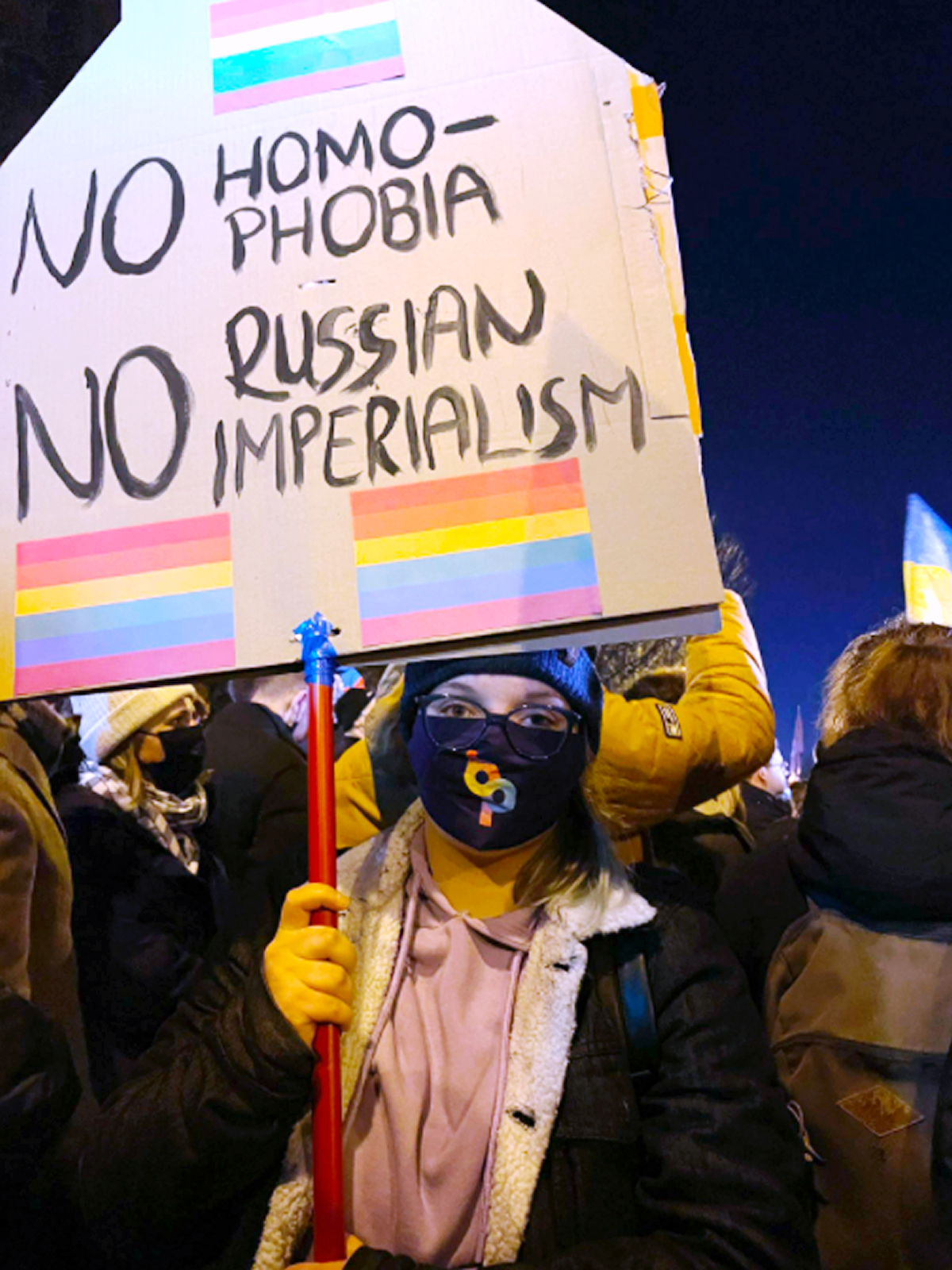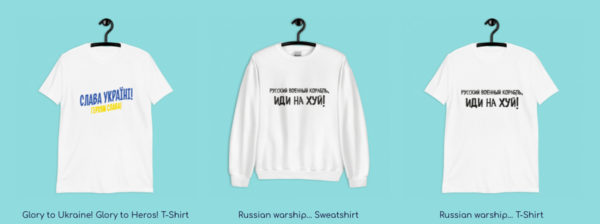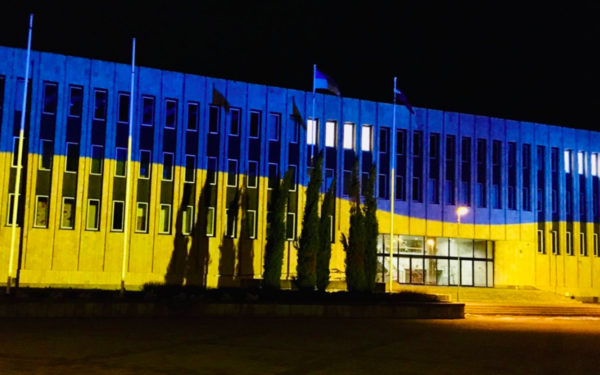Europe
European LGBTQ activists stand in solidarity with Ukraine counterparts
EuroPride fundraiser has raised more than $17,000

LGBTQ activists across Europe continue to stand in solidarity with their counterparts in Ukraine in the wake of Russia’s invasion of their country.
“We are ready to host LGBT+ people from Ukraine here,” said Anastasia Danilova, executive director of Genderdoc-M, an LGBTQ rights group in Moldova, which borders Ukraine, told the Washington Blade on Sunday. “We will provide all necessary support: Accommodation, meals, counseling and medical support.”
Genderdoc-M members on Feb. 24 participated in a protest outside the Russian Embassy in Chisinau, the Moldovan capital.
Danilova described Russian President Vladimir Putin as a “crazy guy.” Danilova also noted Transnistria, a pro-Russian breakaway region, is in Moldova.
“[Putin] is sick and he is unstoppable,” said Danilova.
“Moldova used to be a part of the Soviet Union and we have a frozen conflict in the Transnistrian region,” added Danilova. “We have Russian troops.”
Mozaika, an LGBTQ rights group in Latvia, a Baltic country that borders Russia, on Sunday tweeted the country’s LGBTQ community is “together with Ukraine, both in thought and deed.” Mozaika through its online Diversity Shop is selling Ukraine-specific t-shirts and other clothes to raise money for the country’s LGBTQ rights groups.

A EuroPride fundraiser has raised more than €16,000 ($17846.32) for Kyiv Pride and Kharkiv Pride in Ukraine. OutRight Action International has raised more than $105,000 for LGBTQ Ukrainians through a fund it created after Russia launched its invasion of the country.
“Let’s give our community some sense of hope and help, by providing the funds they need to survive, and the resilience they need to thrive,” said OutRight Action International in its appeal.
Kampania Przeciw Homofobii (Campaign Against Homophobia), an LGBTQ rights group in Poland, which borders Ukraine, has also urged their members and supporters to help LGBTQ Ukrainians. Kampania Przciw Homofobii, like advocacy groups in Hungary and other European countries, have also participated in protests against the invasion.
“Don’t be passive: Act,” proclaimed Kampania Przciw Homofobii in a Feb. 24 tweet.

Situation for LGBTQ Ukrainians ‘is dire’
The invasion has sparked worldwide condemnation and sweeping sanctions against Russia, Putin and members of his inner circle.
Magomed Tushayev, a Chechen warlord who played a role in the anti-LGBTQ crackdown in his homeland, on Saturday died during a skirmish with the Ukrainian military’s elite Alpha Group outside of Kyiv, the country’s capital. A White House official late last week told the Blade the Biden administration has “engaged directly” with LGBTQ Ukrainians and other groups that Russia may target if it gains control of their country.
“We remain (in Ukraine) to defend ourselves and our country and will continue to help people,” wrote Olena Shevchenko, chair of Insight, a Ukrainian LGBTQ rights group, on Feb. 24 in a Blade op-ed. “Our activists from the LGBTQI+ communities are staying and keep working, providing support to the most marginalized ones. Honestly, I don’t know how long we will be able to resist, but we will do our best for sure.”
Anna Sharyhina co-founded the Sphere Women’s Association, which is based in Kharkiv, the country’s second-largest city that is less than 30 miles from the Russian border in eastern Ukraine. Sphere Women’s Association, among other things, organizes Kharkiv Pride.
“The situation we, activists, human rights defenders, the LGBT+ community and the entire Ukraine, are in is dire,” wrote Sharyhina on Sunday in an email to supporters. “Several times a day, for hours and hours, we hear explosions of varying intensity and receive information about new shelling and attacks by Russian troops.”
“Even now, while I am composing this address, I hear shootings and explosions,” added Sharyhina. “It is extremely hard to work and make even simple decisions in such conditions. Many have left, others are seeking shelter locally.”
Sharyhina said the organization plans to begin to hold “daily online emergency meetings” and has begun to plan on how “to help people in the LGBT+ community because they are in a very vulnerable state.”
“We have come to a conclusion that funds may be needed for housing, food, relocation from dangerous areas, hygiene products, warm blankets, mats, and so on,” wrote Sharyhina, who asked supporters to make donations.
“With sincere faith in freedom, democracy and human rights in Ukraine,” ends the email.
Books
New book profiles LGBTQ Ukrainians, documents war experiences
Tuesday marks four years since Russia attacked Ukraine

Journalist J. Lester Feder’s new book profiles LGBTQ Ukrainians and their experiences during Russia’s war against their country.
Feder for “The Queer Face of War: Portraits and Stories from Ukraine” interviewed and photographed LGBTQ Ukrainians in Kyiv, the country’s capital, and in other cities. They include Olena Hloba, the co-founder of Tergo, a support group for parents and friends of LGBTQ Ukrainians, who fled her home in the Kyiv suburb of Bucha shortly after Russia launched its war on Feb. 24, 2022.
Russian soldiers killed civilians as they withdrew from Bucha. Videos and photographs that emerged from the Kyiv suburb showed dead bodies with their hands tied behind their back and other signs of torture.

Olena Shevchenko, chair of Insight, a Ukrainian LGBTQ rights group, wrote the book’s forward.

The book also profiles Viktor Pylypenko, a gay man who the Ukrainian military assigned to the 72nd Mechanized Black Cossack Brigade after the war began. Feder writes Pylypenko’s unit “was deployed to some of the fiercest and most important battles of the war.”
“The brigade was pivotal to beating Russian forces back from Kyiv in their initial attempt to take the capital, helping them liberate territory near Kharkiv and defending the front lines in Donbas,” wrote Feder.
Pylypenko spent two years fighting “on Ukraine’s most dangerous battlefields, serving primarily as a medic.”
“At times he felt he was living in a horror movie, watching tank shells tear his fellow soldiers apart before his eyes,” wrote Feder. “He held many men as they took their final breaths. Of the roughly one hundred who entered the unit with him, only six remained when he was discharged in 2024. He didn’t leave by choice: he went home to take care of his father, who had suffered a stroke.”
Feder notes one of Pylypenko’s former commanders attacked him online when he came out. Pylypenko said another commander defended him.
Feder also profiled Diana and Oleksii Polukhin, two residents of Kherson, a port city in southern Ukraine that is near the mouth of the Dnieper River.
Ukrainian forces regained control of Kherson in November 2022, nine months after Russia occupied it.
Diana, a cigarette vender, and Polukhin told Feder that Russian forces demanded they disclose the names of other LGBTQ Ukrainians in Kherson. Russian forces also tortured Diana and Polukhin while in their custody.
Polukhim is the first LGBTQ victim of Russian persecution to report their case to Ukrainian prosecutors.

Feder, who is of Ukrainian descent, first visited Ukraine in 2013 when he wrote for BuzzFeed.
He was Outright International’s Senior Fellow for Emergency Research from 2021-2023. Feder last traveled to Ukraine in December 2024.
Feder spoke about his book at Politics and Prose at the Wharf in Southwest D.C. on Feb. 6. The Washington Blade spoke with Feder on Feb. 20.
Feder told the Blade he began to work on the book when he was at Outright International and working with humanitarian groups on how to better serve LGBTQ Ukrainians. Feder said military service requirements, a lack of access to hormone therapy and documents that accurately reflect a person’s gender identity and LGBTQ-friendly shelters are among the myriad challenges that LGBTQ Ukrainians have faced since the war began.
“All of these were components of a queer experience of war that was not well documented, and we had never seen in one place, especially with photos,” he told the Blade. “I felt really called to do that, not only because of what was happening in Ukraine, but also as a way to bring to the surface issues that we’d had seen in Iraq and Syria and Afghanistan.”

Feder also spoke with the Blade about the war’s geopolitical implications.
Russian President Vladimir Putin in 2013 signed a law that bans the “promotion of homosexuality” to minors.
The 2014 Winter Olympics took place in Sochi, a Russian resort city on the Black Sea. Russia annexed Crimea from Ukraine a few weeks after the games ended.
Russia’s anti-LGBTQ crackdown has continued over the last decade.
The Russian Supreme Court in 2023 ruled the “international LGBT movement” is an extremist organization and banned it. The Russian Justice Ministry last month designated ILGA World, a global LGBTQ and intersex rights group, as an “undesirable” organization.
Ukraine, meanwhile, has sought to align itself with Europe.
Ukrainian President Volodymyr Zelenskyy after a 2021 meeting with then-President Joe Biden at the White House said his country would continue to fight discrimination based on sexual orientation and gender identity. (Zelenskyy’s relationship with the U.S. has grown more tense since the Trump-Vance administration took office.) Zelenskyy in 2022 publicly backed civil partnerships for same-sex couples.
Then-Ukrainian Ambassador to the U.S. Oksana Markarova in 2023 applauded Kyiv Pride and other LGBTQ and intersex rights groups in her country when she spoke at a photo exhibit at Ukraine House in D.C. that highlighted LGBTQ and intersex soldiers. Then-Kyiv Pride Executive Director Lenny Emson, who Feder profiles in his book, was among those who attended the event.
“Thank you for everything you do in Kyiv, and thank you for everything that you do in order to fight the discrimination that still is somewhere in Ukraine,” said Markarova. “Not everything is perfect yet, but you know, I think we are moving in the right direction. And we together will not only fight the external enemy, but also will see equality.”
Feder in response to the Blade’s question about why he decided to write his book said he “didn’t feel” the “significance of Russia’s war against Ukraine” for LGBTQ people around the world “was fully understood.”
“This was an opportunity to tell that big story,” he said.
“The crackdown on LGBT rights inside Russia was essentially a laboratory for a strategy of attacking democratic values by attacking queer rights and it was one as Ukraine was getting closet to Europe back in 2013, 2014,” he added. “It was a strategy they were using as part of their foreign policy, and it was one they were using not only in Ukraine over the past decade, but around the world.”
Feder said Republicans are using “that same strategy to attack queer people, to attack democracy itself.”
“I felt like it was important that Americans understand that history,” he said.
Netherlands
Rob Jetten becomes first gay Dutch prime minister
38-year-old head of government sworn in on Monday

Rob Jetten on Monday became the Netherland’s first openly gay prime minister.
Jetten’s centrist D66 party won the country’s elections last October, narrowly defeating Geert Wilders’ far-right Party for Freedom.
King Willem-Alexander on Monday swore in Jetten, who is also the country’s youngest-ever prime minister. The Associated Press notes Jetten’s coalition government includes the center-right Christian Democrats and the center-right People’s Party for Freedom and Democracy.
“Proud to be able to do this together,” said Jetten in an X post before Willem-Alexander swore him in.
COC Nederland, a Dutch LGBTQ advocacy group, in a statement said Jetten “becoming prime minister shows that your sexual orientation doesn’t have to matter.”
“You can become a construction worker, a doctor, a lawyer, and even prime minister,” said COC Nederland.
The advocacy group noted Jetten has said his government will implement its “Rainbow Agreement” that include calls for strengthening nondiscrimination laws “to better protect transgender and intersex people,” appointing more “discrimination investigators … to address violence against LGBTQ+ people and other minorities,” and introducing measures “to promote acceptance in schools.”
“COC will hold the Cabinet to that promise,” said COC Nederland.
Jetten’s fiancé is Nicolás Keenen, an Argentine field hockey player who competed in the 2024 Summer Olympics in Paris.
Jetten is one of two openly gay heads of government: Andorran Prime Minister Xavier Espot Zamora came out in 2023. Gay Latvian President Edgars Rinkēvičs, who is the country’s head of state, took office in 2023.
Leo Varadkar, who was Ireland’s prime minister from 2017-2020 and from 2022-2024, and Xavier Bettel, who was Luxembourg’s prime minister from 2013-2023, are gay. Ana Brnabić, who was Serbia’s prime minister from 2017-2024, is a lesbian.
Former Icelandic Prime Minister Jóhanna Sigurðardóttir in 2009 became the world’s first openly lesbian head of government. Former Belgian Prime Minister Elio Di Rupo, former San Marino Captain Regent Paolo Rondelli, and former French Prime Minister Gabriel Attal are also openly gay.
Colombian presidential candidate Claudia López, who is the former mayor of Bogotá, the Colombian capital, would become her country’s first female and first lesbian president if she wins the country’s presidential election that is taking place later this year.
European Union
European Parliament resolution backs ‘full recognition of trans women as women’
Non-binding document outlines UN Commission on the Status of Women priorities

The European Parliament on Feb. 11 adopted a transgender-inclusive resolution ahead of next month’s U.N. Commission on the Status of Women meeting.
The resolution, which details the European Union’s priorities ahead of the meeting, specifically calls for “the full recognition of trans women as women.”
“Their inclusion is essential for the effectiveness of any gender-equality and anti-violence policies; call for recognition of and equal access for trans women to protection and support services,” reads the resolution that Erin in the Morning details.
The resolution, which is non-binding, passed by a 340-141 vote margin. Sixty-eight MPs abstained.
The commission will meet in New York from March 10-21.
A sweeping executive order that President Donald Trump signed shortly after he took office for a second time on Jan. 20, 2025, said the federal government’s “official policy” is “there are only two genders, male and female.” The Trump-Vance administration has withdrawn the U.S. from the U.N. LGBTI Core Group, a group of U.N. member states that have pledged to support LGBTQ and intersex rights, and dozens of other U.N. entities.




















